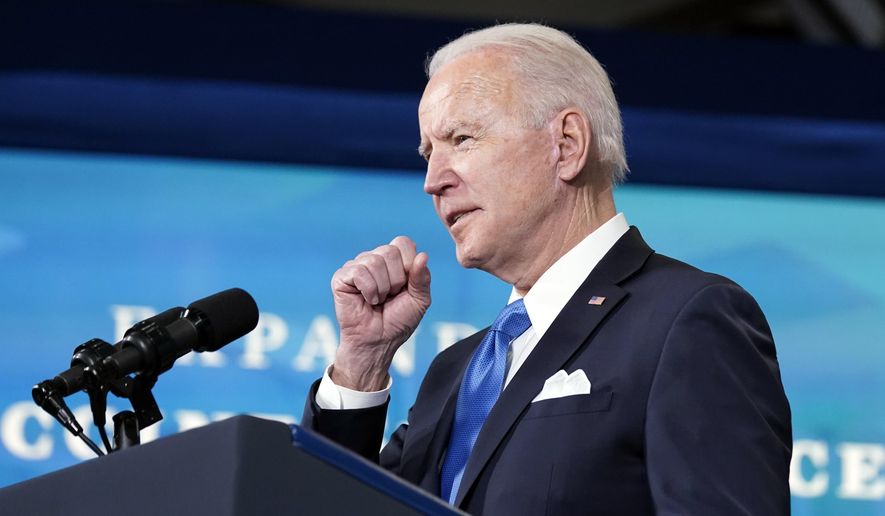President Biden will mark the anniversary of the COVID-19 pandemic Thursday with a prime-time address to celebrate his $1.9 trillion relief bill and shoulder the responsibility of crushing the virus and restoring normalcy in the U.S.
The pathogen that sparked a global crisis last March was supposed to sideline Americans for six weeks, but it ended up killing more than half a million people, closing businesses and forcing children out of school over the past year.
Mr. Biden will speak to a nation that remains emotionally and physically scarred but sees sunlight poking through the clouds, with a trio of COVID-19 vaccines protecting millions of Americans and hospitalizations and daily death counts starting to drop.
The president will be under pressure to exude optimism and use his relief package of direct checks, vaccination support and local aid to finish the job after he was fiercely critical of President Trump’s approach to the crisis last year.
“I’m going to launch the next phase of the COVID response and explain what we will do as a government and what we’ll ask of the American people. There is light at the end of this dark tunnel of the past year,” Mr. Biden said Wednesday. “We cannot let our guard down now or assume that victory is inevitable. Together, we’re going to get through this pandemic and usher in a healthier and more hopeful future. There’s real reason for hope, folks.”
The U.S. is administering more than 2 million doses per day of the vaccines, which were developed under the Trump administration’s Operation Warp Speed. A quarter of U.S. adults have received at least one dose of the two-dose versions from Pfizer-BioNTech and Moderna or the one-shot vaccine from Johnson & Johnson.
Mr. Biden said there will be enough doses for every adult who wants one by the end of May, though he announced Wednesday that his administration plans to buy an additional 100 million doses of the J&J vaccine as a kind of insurance policy in case vaccine makers encounter production hiccups.
“We need maximum flexibility,” Mr. Biden said at a White House event with Johnson & Johnson CEO Alex Gorsky and Merck CEO Kenneth C. Frazier. Merck agreed to use two of its facilities to churn out the J&J vaccine.
Mr. Biden will make his prime-time address on COVID-19 365 days after World Health Organization leaders concluded that the fast-spreading disease was a full-blown pandemic.
At the time, the virus had swept through its origin city of Wuhan, China, sparked a scare in South Korea and overran hospitals in northern Italy. It also sent Wall Street into turmoil and forced Mr. Trump to scramble for ventilators, close U.S. borders, and ask people to work and learn from home.
Mr. Trump downplayed the threat at first, likening COVID-19 to the flu. The U.S. lacked reliable tests after a diagnostic test from the Centers for Disease Control and Prevention failed and regulators were slow to let private and university labs make their own.
“I think diagnostic testing is the original sin of this pandemic,” said Amesh Adalja, a senior scholar at the Johns Hopkins Center for Health Security. “We also had a president who disdained testing and said that the more we test the more cases we would find and it made us look bad in a mind-boggling scoreboard approach to the pandemic — as if not looking erases the reality of something.”
Mr. Trump’s request to maintain “social distancing” for two weeks in March stretched through April before a patchwork of state rules and regional spikes in cases, hospitalizations and deaths unfolded in a tumultuous campaign year.
The death toll didn’t reach the 2 million that some models projected — Mr. Trump pointed to early decisions to cut off travel from China — but it is approaching 530,000, a toll that many Americans would have considered unfathomable a year ago.
Mr. Trump waffled at times on mask-wearing, even as he formally recommended it in situations where people couldn’t maintain physical distance. He told campaign supporters that the pandemic was turning the corner even as the case tally rose in October and he battled the virus personally after a White House outbreak.
But he also overcame doubters last spring by swiftly producing enough ventilators for any patient who needed one and eventually giving the surplus to other countries. He also put the conditions in place to test and approve multiple vaccines to offer a way out of the global nightmare.
Michael Bars, who was a White House senior communications adviser, said given those accomplishments, the new administration needs to overcome its “credibility challenge” and restore educational and economic opportunities.
“Biden began by saying there wasn’t a vaccine or plan in place, which for Americans who were intensely following this for the past year simply wasn’t accurate,” Mr. Bars said.
“Fundamentally, people want schools and their businesses open, confidence that we are determined to restore our way of life. We don’t see an administration that is leaning in where it matters most. This is about safely reopening.”
• Tom Howell Jr. can be reached at thowell@washingtontimes.com.




Please read our comment policy before commenting.